ARTICLE AD BOX

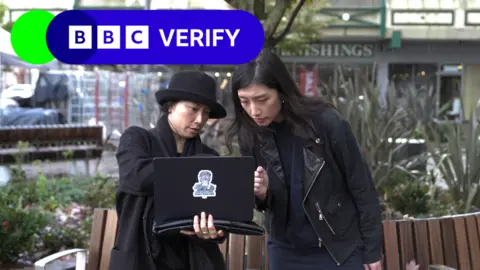 BBC
BBC
Tuyet van Huynh (left) is campaigning to track down the scammers
Chinese communities are being targeted by scammers who trick older women out of their valuables by persuading them their loved ones are in danger.
After a wave of cases on the streets of the UK, US, Australia and Canada, police are investigating and victims' families are trying to find the perpetrators.
The blessing scam is an elaborate piece of criminal street theatre. A gang of usually three women act out a well-rehearsed script in Cantonese for an audience of one - the unsuspecting victim.
Mungnee is a Chinese Malaysian Londoner in her sixties. She was approached on Harrow Road in West London while on her way to yoga, by a crying woman. The woman asked in Cantonese if Mungnee knew a specific Chinese traditional healer in the area, as her husband was sick.

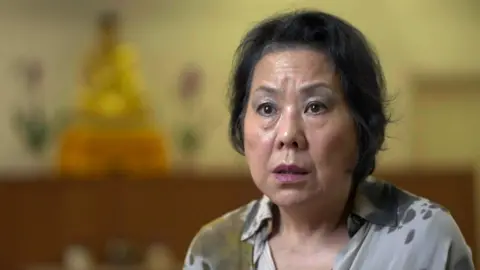
Mungnee feels she was drawn in by the scammers because she holds spiritual beliefs
Quickly, a second Cantonese-speaking stranger appeared, claiming she knew the healer, and offering to take them to him. Mungnee was swept along, keen to help the woman who was so upset. On a quieter side street, a third woman joined the group, claiming to be related to the healer and went to see if he could help.
When she returned from speaking to the healer for 15 minutes, she had troubling news. Through his mystical powers, he had apparently discovered Mungnee was also in danger. He miraculously seemed to know all about her marriage problems, the shooting pain in her right leg - things Mungnee had not shared with them.
But the next revelation was what shocked Mungnee.
“Your son is going to have an accident in the next three days and he's going to die.”
The woman told Mungnee the healer could bestow a blessing that would protect her adult son.
The ladies told her: “You need to take a handful of rice, and put in as much gold and cash in a bag as you can”. They would say a blessing over the valuables.
Mungnee says she felt reassured by the promise her items would be returned to her after the blessing.
One of the women rushed Mungnee home to collect her jewellery, then to the bank to withdraw £4,000 in cash from her savings. The valuables were placed in a plastic bag.
Mungnee thinks this must have been the moment the bags were exchanged.
“It was quick as a flash - her hands are so nimble. I didn't see anything.”
When she got home, Mungnee was shocked to look inside the black bag and find only a brick, a piece of cake, and two bottles of water. She says: “That's when I just turned cold.. and then I just told my son. ‘I think I've been conned. I've been scammed.’”
Some of the items stolen had been in the family for generations, passed down by her mother.

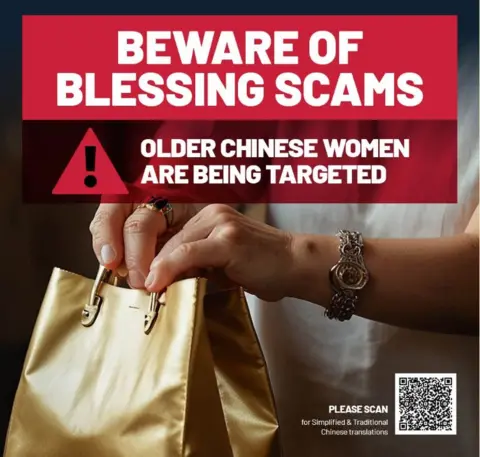 New South Wales Police
New South Wales Police
Police in the US, Canada, Australia and the UK have issued warnings about blessing scams over the past year
Mungnee’s experience is a textbook example of a blessing scam. The BBC has spoken to multiple victims who all tell similar stories - from the distraught stranger, to the claims evil spirits are threatening a relative. Even the name of the fictional healer is the same in many cases - ‘Mr Koh’.
All the victims are scammed within a few hours, in Mungnee’s case the whole con only took about three hours from beginning to end.
Anqi Shen is a law professor at Northumbria University and a former Chinese police officer. She believes the blessing scam is the latest example of a centuries old tradition of street crime that exploits spiritual beliefs.
“Chinese people tend to keep some valuable jewellery especially pieces made of gold, silver, jade, believed to hold protective powers,” Shen explains.
She says it’s believable to victims that after such items are blessed, they could offer even greater protection.

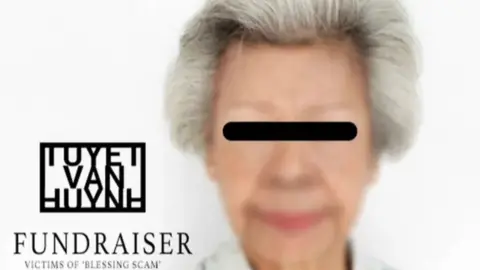 Tuyet van Huynh
Tuyet van Huynh
A social media campaign has encouraged other blessing scam victims to come forward
Tuyet van Huynh has started a social media campaign to raise awareness about the blessing scam, after her mother was scammed out of tens of thousands of pounds in May.
Her mum was shopping in Upton in East London when three women playing the same roles persuaded her that her son was threatened by evil spirits.
Police in the US, Canada, and Australia have issued warnings about blessing scams over the past year.
In the UK, Mungnee and Tuyet’s mother have both reported their cases to the Metropolitan Police, who have also revealed they are investigating a number of cases in the Islington area of London.
Tuyet has received reports of other incidents in Lewisham, Romford, Liverpool and, Manchester.
She began to investigate what happened by gathering CCTV recordings from the area where her mother was approached. Tuyet says the footage showed her mother "followed every instruction to the point where she was like a zombie".

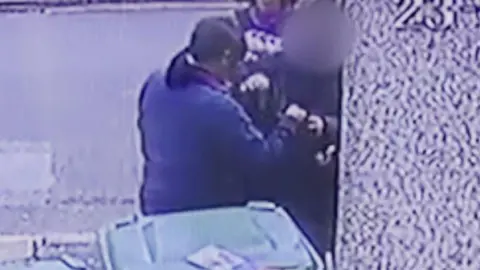 Tuyet van Huynh
Tuyet van Huynh
Tuyet showed the BBC the CCTV footage which she tracked down of her mum with the scammers
Tuyet’s mother can’t explain how the crooks pulled her in with the story of the healer, as she is adamantly not superstitious nor spiritual.
Tuyet wondered if something else might have been involved. She began to research if there was a drug that could have put her mum under somebody’s influence, but also leave her lucid enough to gather her valuables from hiding places around her home.
She has a theory: “It's a possibility that this is a drug called the Devil's Breath.”
Scopolamine, colloquially known as Devil’s Breath, is used to treat motion sickness. In the right dose it can reportedly make people highly suggestable - temporarily compromising a person’s free will. It can be administered to victims in the street, without them realising they have been drugged.
Tuyet has no evidence that this medication was used in her mother’s or any other case. It is one of very few drugs that could have such a lucid effect, and it has been used in robberies in Ecuador, France and Vietnam, as well as murders and sexual assaults in Colombia.


Devil’s Breath is derived from a flower that grows in Colombia
While it's not known if this drug is involved in blessing scams in the UK, even if it was it would be difficult to establish.
The drug passes through the body very quickly, so when Tuyet tried to get her mum tested for the drug the next day, it was already too late.
Lisa Mills, a fraud expert from the charity Victim Support, says there may be other reasons the scam is so effective, and the set-up is designed to reel victims in quickly.
“You are getting people that mirror you in terms of you know they look like you. They're female, similar age, speaking your language,” she explains.

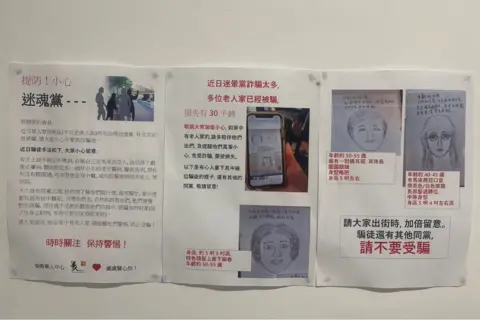
Blessing scam warnings are circulating in Chinese community centres in the UK
At the moment the scammers are still at large, but some victims' families are determined to find them
Mungnee says: “I told the police, I'm willing to do anything to catch these people”.
What also upsets her is that the scammers are Chinese: “They are conning their own people”.
Additional reporting by Austin Landis in Colombia.



 3 months ago
16
3 months ago
16
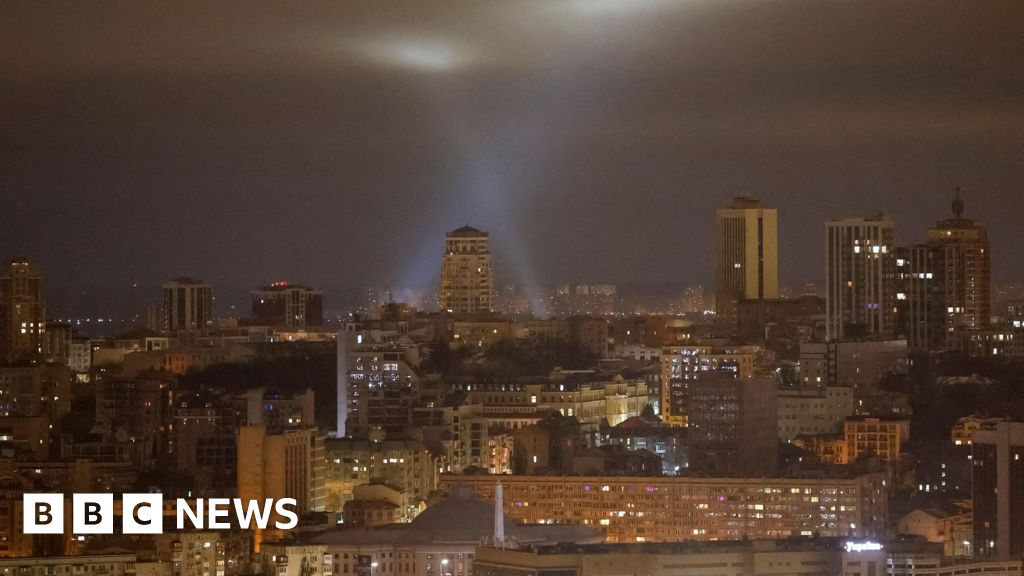
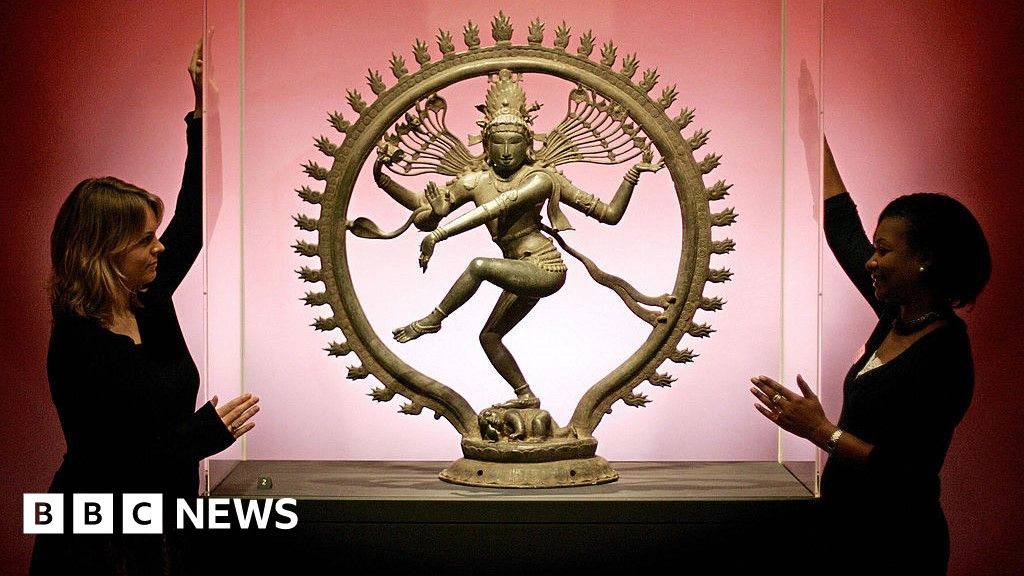






 English (US) ·
English (US) ·